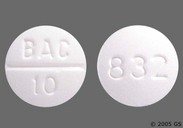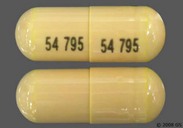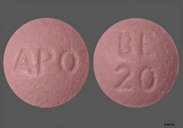B
Drug Class:
Drug Class:
Drug Class:
Precautions and Contraindications
Hypersensitivity, including hypersensitivity to mesalamine or salicylates
Drug Class:
Side Effects/Adverse Reactions
Dental Considerations
General:
• Patients requiring use of this medication probably will be limited in activities or bedridden.
• Determine why patient is taking the drug.
• Diabetes: question patient about self-monitoring of blood glucose values or finger-stick records.
• Diabetics may be more susceptible to infection and have delayed wound healing.
• Examine for oral manifestation of opportunistic infection.
• Patients with advanced diabetes should be questioned about any limitations in activities or stress tolerance. Some will also be receiving dialysis treatment if renal function is compromised. Dental treatment usually can be performed the day after dialysis.
Consultations:
• Medical consultation may be required to assess disease control and patient’s ability to tolerate stress.
• Medical consultation may include data from patient’s blood glucose monitoring, including glycosylated hemoglobin or HbA1c testing.
• Patients in dialysis may require antibiotic prophylaxis; determine need.
beclomethasone dipropionate/beclomethasone dipropionate hfa
be-kloe-meth′-ah-sone di-pro′-pi-o-nate
Nasal inhalation: Beconase, Beconase AQ Nasal, Vancenase AQ 84 mcg, Vancenase Pockethaler
Drug Class:
Uses
Treatment of chronic asthma, prevention of recurrent nasal polyps, allergic and nonallergic rhinitis
Indications and Dosages
Dental Considerations
General:
• Evaluate respiration characteristics and rate.
• Assess salivary flow as a factor in caries, periodontal disease, and candidiasis.
• Place on frequent recall because of oral side effects.
• Be aware that aspirin or sulfite preservatives in vasoconstrictor-containing products can exacerbate asthma.
• Acute asthmatic episodes may be precipitated in the dental office. Sympathomimetic inhalants should be available for emergency use.
• Morning appointments and a stress-reduction protocol may be required for anxious patients.
Drug Class:
Angiotensin-converting enzyme (ACE) inhibitor
Serious Reactions
! Excessive hypotension (“first-dose syncope”) may occur in patients with CHF and in those who are severely salt or volume depleted.
! Angioedema (swelling of the face and lips) and hyperkalemia occur rarely.
! Agranulocytosis and neutropenia may be noted in those with collagen vascular disease, including scleroderma and systemic lupus erythematosus, and impaired renal function.
! Nephrotic syndrome may be noted in patients with history of renal disease.
Dental Considerations
General:
• Monitor vital signs at every appointment because of cardiovascular and respiratory side effects.
• After supine positioning, have patient sit upright for at least 2 min to avoid orthostatic hypotension.
• Patients on chronic drug therapy may rarely have symptoms of blood dyscrasias, which can include infection, bleeding, and poor healing.
• Assess salivary flow as a factor in caries, periodontal disease, and candidiasis.
• Limit use of sodium-containing products, such as saline IV fluids, for those patients with a dietary salt restriction.
• Use vasoconstrictors with caution, in low doses, and with careful aspiration.
• Stress from dental procedures may compromise cardiovascular function; determine patient risk.
• Short appointments and a stress-reduction protocol may be required for anxious patients.
Consultations:
• Medical consultation may be required to assess disease control and patient’s ability to tolerate stress.
• In a patient with symptoms of blood dyscrasias, request a medical consultation for blood studies and postpone dental treatment until normal values are reestablished.
• Take precautions if dental surgery is anticipated and sedation or general anesthesia is required; risk of hypotensive episode.
Drug Class:
Antineoplastic agent, alkylating agent
Indications and Dosages
Precautions and Contraindications
Hypersensitivity to bendamustine, mannitol, or any component of the formulation.
May cause fetal harm if administered to a woman during pregnancy.
Use appropriate precautions for handling and disposal.
Do not administer to children.
Serious Reactions
! Bone marrow suppression has occurred.
! Dermatologic toxicity including hypersensitivity/infusion reaction (chills, fever, pruritus, and rash) may occur.
! Infection such as pneumonia and sepsis have been reported.
! Tumor lysis syndrome occurring in the first treatment cycle. May lead to life-threatening acute renal failure.
Dental Considerations
General:
• Monitor vital signs at every appointment because of cardiovascular side effects.
• Patients on chronic drug therapy may have symptoms of blood dyscrasias, which can include infection, bleeding, and poor healing.
• Examine for oral manifestation of opportunistic infection.
• Consider semisupine chair position for patient comfort if GI side effects occur.
• Evaluate allergic reactions: rash, urticaria.
• Stomatitis and xerostomia may complicate dental treatment and oral hygiene.
Drug Class:
Precautions and Contraindications
Anuria, history of hypersensitivity to sulfonamides or thiazide diuretics
Serious Reactions
! Vigorous diuresis may lead to profound water and electrolyte depletion, resulting in hypokalemia, hyponatremia, and dehydration.
! Acute hypotensive episodes may occur.
! Hyperglycemia may be noted during prolonged therapy.
! Pancreatitis, blood dyscrasias, pulmonary edema, allergic pneumonitis, and dermatologic reactions occur rarely.
! Overdose can lead to lethargy and coma without changes in electrolytes or hydration.
Dental Considerations
General:
• Monitor vital signs at every appointment due to cardiovascular side effects.
• Patient on chronic drug therapy may rarely present with symptoms of blood dyscrasias, which can include infection, bleeding, and poor healing. If dyscrasia is present, caution patient to prevent oral tissue trauma when using oral hygiene aids.
Stay updated, free dental videos. Join our Telegram channel

VIDEdental - Online dental courses


 Superficial Ocular Infections
Superficial Ocular Infections Skin Abrasions, Superficial Skin Infections
Skin Abrasions, Superficial Skin Infections Surgical Treatment and Prophylaxis
Surgical Treatment and Prophylaxis
 Spasticity
Spasticity Ulcerative Colitis
Ulcerative Colitis
 Ulcers
Ulcers
 Hypertension (monotherapy)
Hypertension (monotherapy)
 Hypertension (combination therapy)
Hypertension (combination therapy) Dosage in Renal Impairment
Dosage in Renal Impairment
 Edema
Edema Hypertension
Hypertension